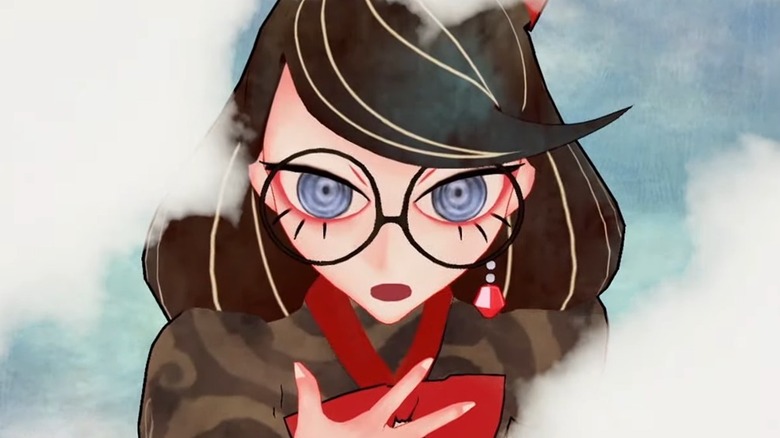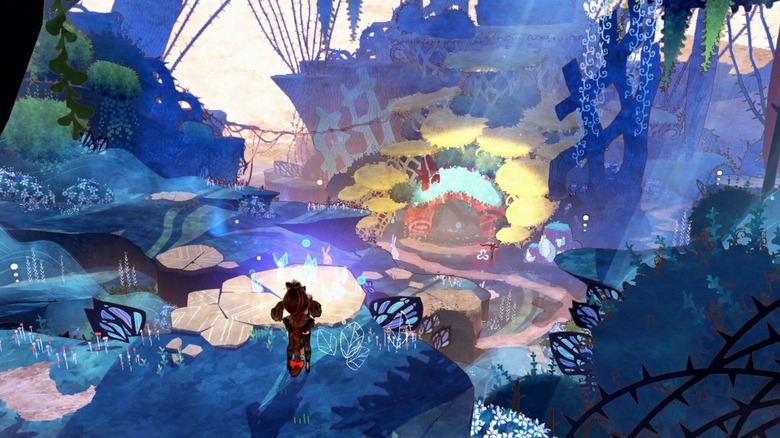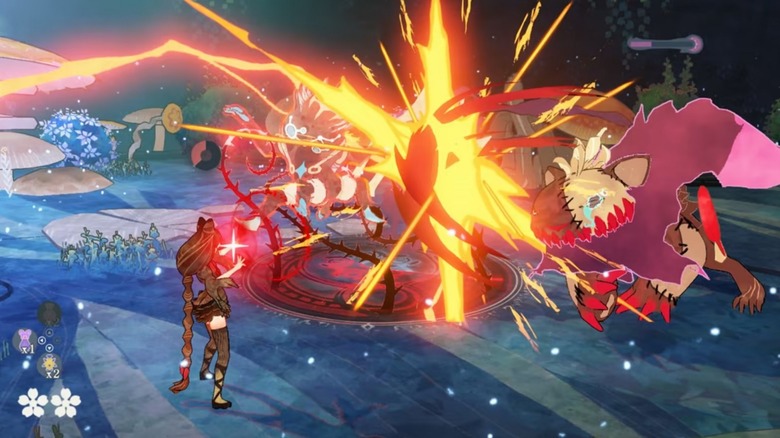Bayonetta Origins: What The Critics Are Saying About The Bold New Prequel
"Bayonetta Origins: Cereza and the Lost Demon" has been drawing attention ever since it was first announced late last year. With its high-octane action gameplay and truly bizarre story, "Bayonetta 3" polarized critics and fans alike, but it also opened up several new avenues for the long-running action franchise. The latest installment in the series introduced the concept of a shared multiverse populated by Bayonetta variants, flinging the doors wide open for the franchise to explore different styles and settings.
Nowhere has that been more apparent than in the art style and gentler nature of "Bayonetta Origins: Cereza and the Lost Demon." In this title, a young Cereza (a.k.a., the witch who will eventually become Bayonetta) finds herself in a dark forest, where she befriends a demon named Cheshire. The new game in the series acts as something of a prequel to the franchise, one that embraces a lighter style of gameplay and a storybook aesthetic. It's a bold move for a franchise that has been best known for its hyper violence and titillating characters, but if early critic responses are anything to by, the gamble is largely paying off.
Bayonetta origins is beautiful and the gameplay is intuitive
The newest game in the series does away with the shooting and instead puts an emphasis on cooperating with your demon pal. Cereza and Cheshire are each controlled with a different joystick on the Nintendo Switch, and critics have found that this can be a bit awkward to figure out at first. Eventually, though, many reviewers have found that this set-up becomes almost second nature. The Verge's Charles Pulliam Moore notes, "After a few seconds of moving the witch / demon duo around and getting accustomed to thinking of them as two halves of a whole meant to be working in concert, 'Cereza and the Lost Demon' quickly becomes just the right amount of mildly gimmicky to feel both inspired and accessible."
Across the board, critics are in love with the art style of "Cereza and the Lost Demon," with many comparing it to classic hand-drawn animation. Eurogamer applauds the attention to detail seen in the visuals, which reviewer Christian Donlan argues is more successful in transcending its 2D elements than "Metroid Dread." Donlan writes, "There is care here, rising off the page, like a story emerging from the opened pages of a children's book and drawing you in."
Cereza and the Lost Demon might not work for classic Bayonetta fans
On the downside of things, this prequel may be a bit too soft for fans of the series, as the title never offers much of a challenged for seasoned gamers. Occasional puzzles break up a bit of the monotony of combat, as do Cheshire's elemental upgrades, but "Cereza and the Lost Demon" is a far cry from the over the top spectacle of the mainline "Bayonetta" series.
Nintendo Life's PJ O'Reilly remains mostly impressed by the game's willingness to experiment with the expected format, but finds that the game settles into a bit of a grind after the first half. O'Reilly writes, "['Bayonetta Origins'] reaches a point where it seems happy to sit back and tell the rest of its tale while the combat and puzzling begin to suffer from repetition, and later areas fail to introduce enough new tricks or rhythms to keep things involving all the way along."
Even so, if players can groove with the monumental tone shift, it sounds like there's still a good bit to enjoy here. The whole experience may ultimately work better for newcomers than longtime series fans, but if nothing else, this is the first entry in the series that younger gamers can easily follow and enjoy.



